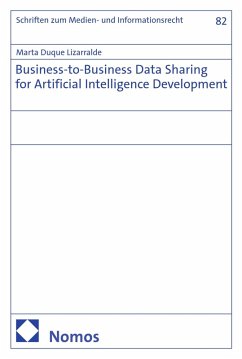
Data Protection and Privacy, Volume 15 (eBook, PDF)
In Transitional Times
Redaktion: Matsumi, Hideyuki; De Hert, Paul; Kosta, Eleni; Dimitrova, Diana; Hallinan, Dara
Versandkostenfrei!
Sofort per Download lieferbar
45,95 €
inkl. MwSt.
Weitere Ausgaben:

PAYBACK Punkte
23 °P sammeln!
This book offers conceptual analyses, highlights issues, proposes solutions, and discusses practices regarding privacy and data protection in transitional times. It is one of the results of the 15th annual International Conference on Computers, Privacy and Data Protection (CPDP), which was held in Brussels in May 2022. We are in a time of transition. Artificial Intelligence is making significant breakthroughs in how humans use data and information, and is changing our lives in virtually all aspects. The pandemic has pushed society to adopt changes in how, when, why, and the media through which...
This book offers conceptual analyses, highlights issues, proposes solutions, and discusses practices regarding privacy and data protection in transitional times. It is one of the results of the 15th annual International Conference on Computers, Privacy and Data Protection (CPDP), which was held in Brussels in May 2022. We are in a time of transition. Artificial Intelligence is making significant breakthroughs in how humans use data and information, and is changing our lives in virtually all aspects. The pandemic has pushed society to adopt changes in how, when, why, and the media through which, we interact. A new generation of European digital regulations - such as the AI Act, Digital Services Act, Digital Markets Act, Data Governance Act, and Data Act - is on the horizon. This raises difficult questions as to which rights we should have, the degree to which these rights should be balanced against other poignant social interests, and how these rights should be enforced in light of the fluidity and uncertainty of circumstances. The book covers a range of topics, including: data protection risks in European retail banks; data protection, privacy legislation, and litigation in China; synthetic data generation as a privacy-preserving technique for the training of machine learning models; effectiveness of privacy consent dialogues; legal analysis of the role of individuals in data protection law; and the role of data subject rights in the platform economy. This interdisciplinary book has been written at a time when the scale and impact of data processing on society - on individuals as well as on social systems - is becoming ever more important. It discusses open issues as well as daring and prospective approaches and is an insightful resource for readers with an interest in computers, privacy and data protection.













